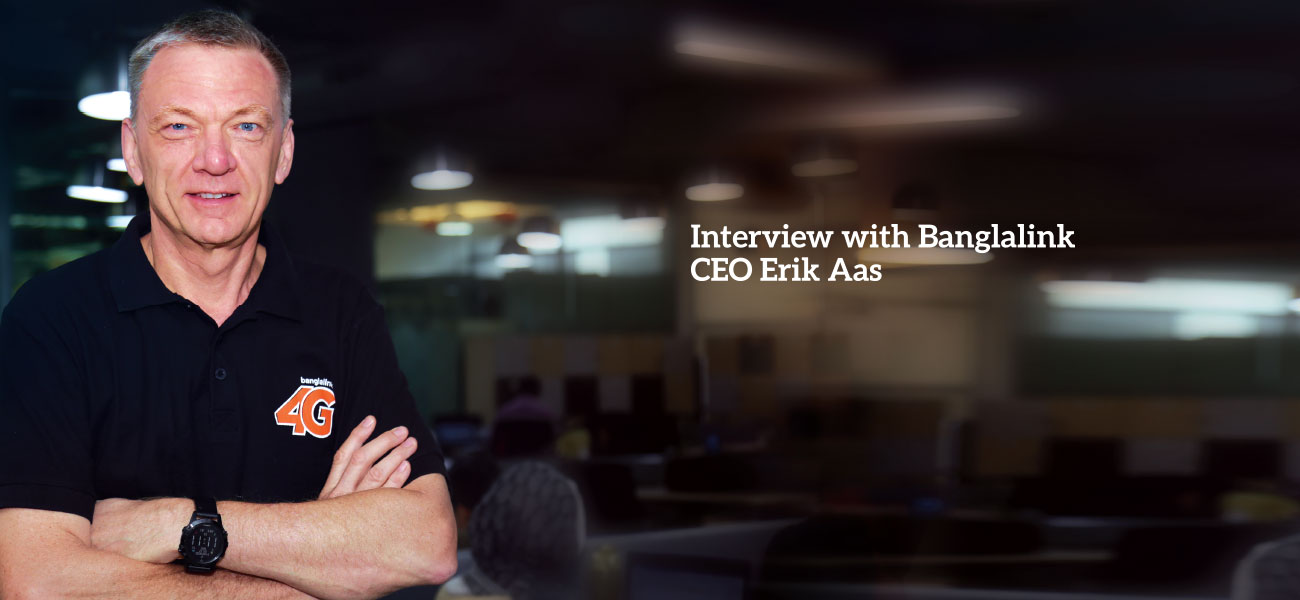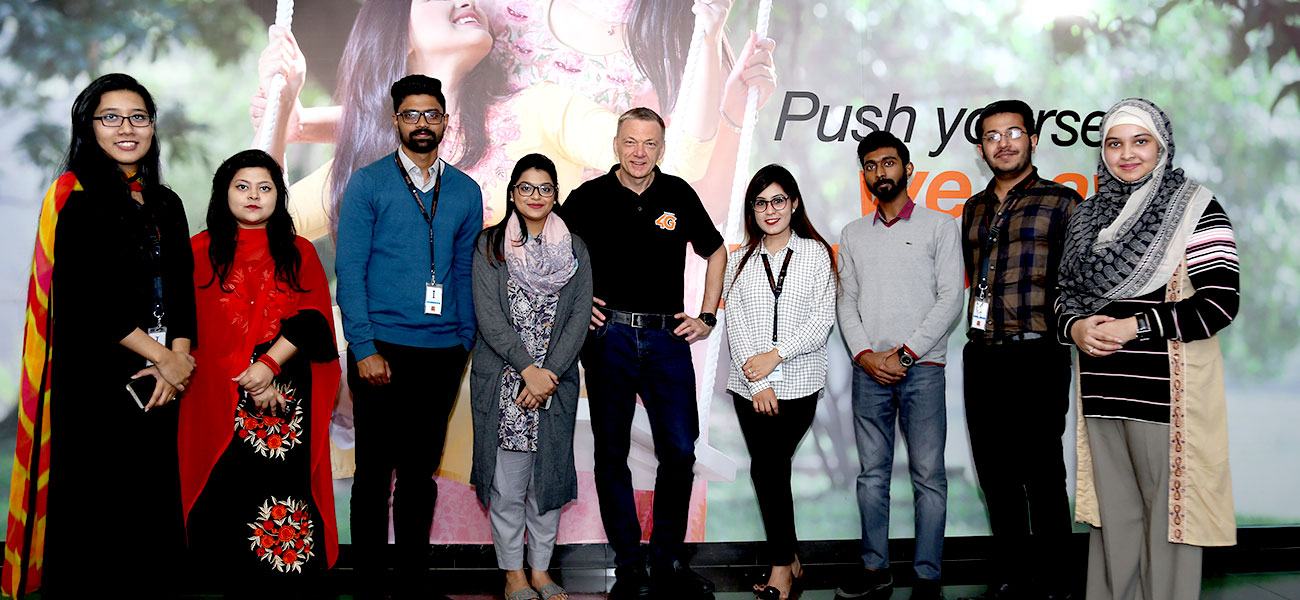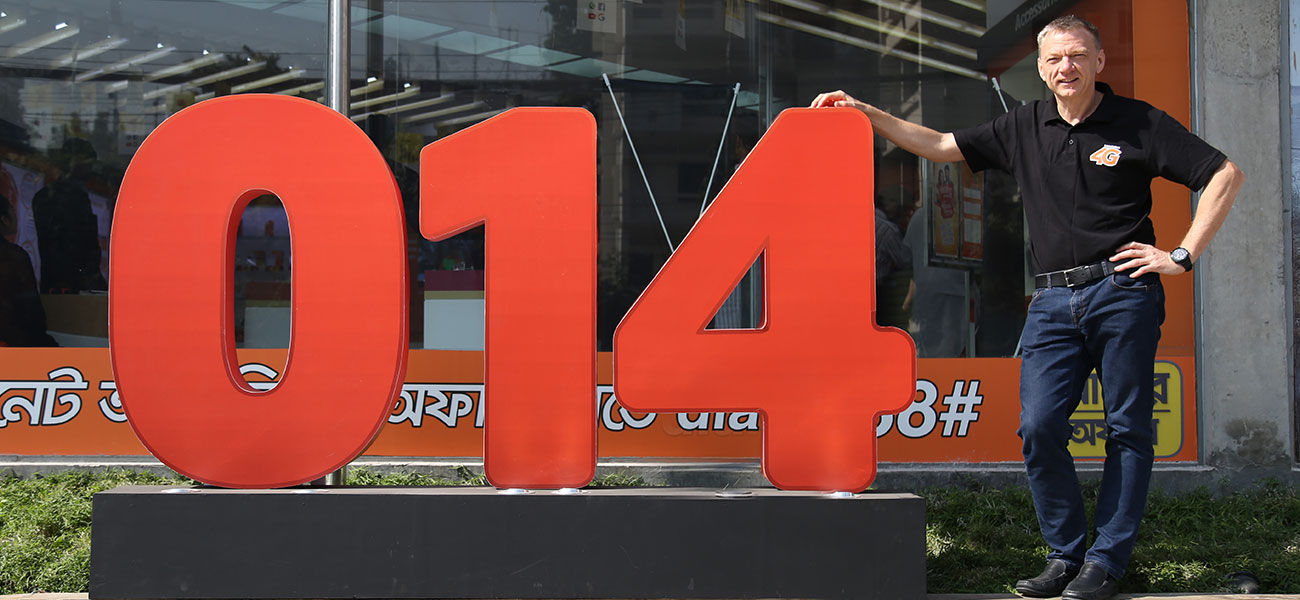
Fintech: When you joined Banglalink you said that it was going through a digital transformation. So at what stage you are in that transformation and what have you achieved so far?
We realized that things were changing fast. First of all, I think the customers are digitizing themselves changing their behaviours. That means we also need to be a digital provider, not a telephony provider. So, that’s the technological part of it.
We need to work as a digital company and I think three years ago we were maybe a little bit old fashioned. We were acting like a telephony company with manual processes and lots of paperwork. So, we realized that we had to change the competencies and processes in the company.
We started working differently to adapt to the changing circumstances. And it was a full shift of the whole company culture. I feel we have had a tremendous development in these three years. Our employees got training, they learnt new things. We have gone through a technology shift, we have improved our 3G, we have launched 4G and we have simplified our products. If you look at our webpage now, you will find that the products are easier to understand. There is a Banglalink app through which customers can get all the services. The digital transformation is not merely related to the fact that it’s all on the screen now, but rather it is digital in the way the company behaves.
As for organizational changes at the core structure level, we all have open desks and the whole setup is different. We don’t have hierarchy in the old traditional style, where you have a guy on the top and then you have the management team.
I think our internal communicationhas become easier too. Because of that, things don’t have to go through all the different layers. I don’t think the smartest people always remainat the top of the organization. I think those who are close to the customers can be the smartest people as well. So that’s been a big change for us, and for me that’s a big part of digitization.
Fintech: You talked about uniform tariff being a significant factor and how the previous model benefitted the dominant player. In terms of market diversity, there aren’t many companies in this market, even less now with the recent merging of Airtel and Robi. Do you think there is room for more companies in this market?
There are four commercial companies including Teletalk now. You need three to have good competition but at the same time you have to remember that telecom is very capital intensive. You have to put in a lot of money, you have to build a network which means five would be too many, even four is too many. That’s why basically Airtel threw in the towel.
I believe three commercial operators is the right number for Bangladesh. We still have to remember that out of those three, or out of the four if you include Teletalk, only one is profitable. If you look at the financials, you will find that only one is profitable and that’s Grameenphone. Robi, Teletalk and we are running losses. And that of course takes us back to SMP regulations, because it is of nobody’s interests that only one operator is profitable. All the operators need tohave healthy financials. That means the government also needs to contribute so that the other operators become profitable. I think the regulatory regime can help every operator become at least reasonably profitable.
Fintech: Talk a little bit about reaching profitability. Is there a threshold as to when it becomes problematic or unsustainable if you continue to bear losses?
It has to become profitable. Those who invest in telecom are always long-term investors. They invest now and get the return in five or ten years. So telecom investors in general are long-term investors.
You need to provide a business plan that shows profitability over time, but it’s also highly dependent on regulations. So, I think our shareholders have been patient, we have seen financial improvements, but we are not yet in the profitable space. We have quite a lot of accumulated losses and we need to go into profitability. Then we can get back all the accumulated losses and say that we are a truly profitable company. It is a long-term process.
Fintech: How is the situation compared to more developed countries? Is it comparable?
It’s comparable, but such things generally take along time in Bangladesh. This is because the ARPU or the revenue per customer is quite low here. So, customers are not spending much money, maybe around Tk.100-120 per month, which is not very much.
So, the time from investment to profitability in Bangladesh is longer than most other countries. And also the taxes are higher. Certainly, Bangladesh wants investments, and in telecom it is going to be foreign investments and everybody wants investors who are really interested. And we have to remember that investors can choose whether they should go to Bangladesh or other countries. They will certainly prefer investment-friendly and profitable markets. That’s where I think Bangladesh also needs to think to be an attractive place for investments. If not profits, at least the investors need to see reasonable returns. I don’t think they are asking for ridiculously high profit or taking lots of money out of the country, but they want to see reasonable returns.

Fintech: One of the main factors in this equation is obviously a shift from feature phones to smartphones because then people can start using data which is one of the key revenue sources for telecom. Do you have any kind of projection how soon that might change or at what rate?
It is changing a bit every day. We see more and more 4G and 3G phones coming into the network. My view is that the process is slow, and it is so because the prices of handsets are still quite high and I believe there are still quite high taxes on handsets.
We see some local productions coming up now. They are starting to produce handsets locally which will take the prices down a bit. It’s all about the prices of handsets and that takes me 10 years back. If you look 10 years back when telecom really became popular, you can realize that the prices of the handsets went down. In the earlier days, when Grameenphone was launched people had to spend around 100 dollars for a phone. Once you take the phone price down to 20 dollars or 15 dollars or 10 dollars, you will get people to buy them.
Fintech: You said the last year was good in terms of regulatory changes. What’s the overall environment like? Is the regulatory environment friendly in Bangladesh?
From my point of view, it is still a kind of over regulated, if you compare the regulatory environment of Bangladesh with other countries. There are more detailed telecom regulations in Bangladesh than in most other countries. The regulator gets involved in too many details. I think the regulator needs to readdress the issue for ensuring the growth of this sector.
Fintech: Do you think that reduces efficiency of the operators?
Yes, due to all the detailed regulations, I think we are holding back many offers that would otherwise be available for the customers. The regulator needs to encourage operators to bring more facilities for customers by making a friendly regulatory-environment. There is a bit of what I call over-regulations in the country.
But I very much appreciate what has been done on spectrum and 4G. In addition, we appreciate the steps taken for the unified tariff and e-SAF. I think the regulators are changing many things in the right direction.
Fintech: You talked about the SMP. Talk a little bit about the changes in the telecom sector that can be brought by the guideline.
I think the guideline is really good. It addresses the problems of monopoly and making one operator the most dominant one. The most dominant player in Bangladesh is obviously Grameenphone. There are certain parts where they control nearly 80 percent of the market share, which is clearly a sing of dominance.
So, I think the guideline is clear. Now it is up to BTRC to implement it. I am looking forward to the dialogue with BTRC about how that should be done.
Fintech: What kind of automation and simplification of services have you implemented and are planning to implement?
We have simplified our tariff structure so that is becomes easier to understand what you buy. Our number one priority was simplification and making sure there is less confusion. Another thing we have done is self-service. You can use your app, you can choose your price-plan and you can easily know what you get. Our policy is pretty clear. We are not hiding anything from the customers. We are not saying one thing and giving you something else.

Fintech: You are running a business and you have to make profits, but in terms of addressing the needs of the people, what are your achievements and what kinds of services will you provide in the future that will change people’s lives?
Our number one priority is the quality of service. So, what really matters is that you get a satisfying experience of using our services. You should experience that Internet is perfect in your car, it is perfect inside the bus, it is perfect in your living room and it is perfect in your office as well. Instead of trying to cover more and more people, our strategy for the last couple of years has been to focus on quality and availability. For this reason, we bought more spectrum.
Fintech: What about Banglalink’s overall performance in 2018?
We are trying our best to turn Banglalink into a digital service provider capable of catering to the demands of the new digital age. In addition to providing our voice calling and internet services, we are striving to bring various digital services that can add values to our customers’ lives. The digital services such as Banglalink Vibe, Banglaflix and Banglalink Boighor were launched with a view to fulfilling that vision. The success of our endeavor is reflected by Banglalink’s growing customer-base and increasing data revenues. According to the 2018-Q3 report, our customer-base and data revenue grew by 2.8% YoY and 11.9% YoY, respectively. As a future-ready organization, we want to utilize all the opportunities brought forth by digitalization to provide more innovative services in the days to come.
Fintech: Mobile Financial Services are facilitating financial inclusion. Interestingly, telecom companies are not allowed to enter the MFS market. How much does that affect financial inclusion?
There’s a lot of talk about gigabytes, Internet, financial inclusion and everything that comes along with it. It is a huge untapped area in Bangladesh, not only from a business perspective. Just think how many people can be brought out of poverty by ensuring their access to financial systems.
The first time I came here was in 2001, and I have seen what technology can do to improve people’s lives. At that time the village phone was the big thing. But the situation changed later and people could afford phones. And of course that changed the whole thing.
As for providing MFS, my view is that mobile operators are technologically capable of providing this service to the masses. We have the technological infrastructures and all other necessary competencies to provide the service. The Government should think over the issue considering our capability and the interest of the people.









If I can remember Banglalink lowered the tariff first and other operator had to lower to match this price and for that reason Banglalink became popular for cheap rate.
Now the revenue is shifting from voice to data , if I analyze the voice revenue should not lower as BLNK has different segment of consumer more than other operators.
If they want to earn revenue from data they have to shift gradually to the upper income segment.
Quality and service: what CEO is telling that people can talk from car, bus and room , he needs huge investment to meet this . If they have plan when can it be..?
To my opinion BLNK still can focus on voice revenue considering their consumer segment and try to get Volte set at cheap rate from India , make their 4G Volte compitable so that the lower income big consumer base can convert to data usage and parallel gradual withdraw of 2g. No more investment on 2g and 3 g.
Cheap smart phone handset to be flooded for lower income customer segment if no plan to adapt Volte.